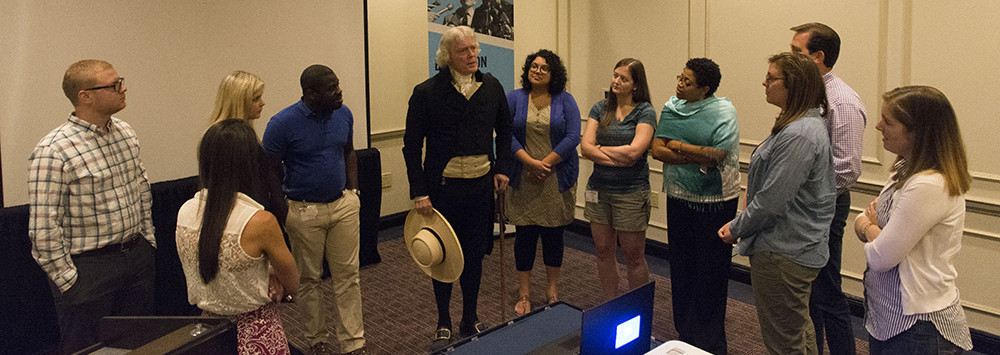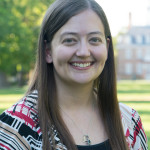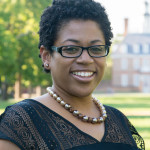
 By Lauren McDuffie of Winston-Salem, N.C.
By Lauren McDuffie of Winston-Salem, N.C.
The first full day of the BJC Fellows Seminar was focused on two separate but vitally important conversations. BJC Executive Director Brent Walker spent the morning leading us in a consideration of the biblical and theological underpinnings of religious liberty, while our afternoon with Professor Michael Meyerson was spent considering the lives and work of several important Baptist leaders, including Roger Williams, John Leland and Isaac Backus. What a legacy to learn from and to be a part of as I live into my own calling as a Baptist minister.
It is a challenge as someone who has grown up in the modern Baptist church to consider how much we have changed. Professor Meyerson began his discussion of Baptist leaders by explaining the ways that Baptists in the colonial and early American period of history saw themselves as a “hated minority.” I became increasingly aware of how much more privileged Baptists are in the United States today, as a powerful denominational group within the context of an American
Christianity dominated by mainline Protestants and evangelicals. I also became aware of how much this privilege impacts the way religious liberty shows up as part of the framework of what it means to be Baptist, or if it even shows up at all. When we no longer face the urgent necessity to fight for our own religious liberty, why would we be compelled to fight for anyone else’s?
The answer is, of course, in the biblically based understanding of soul freedom which we had already spent our morning with Walker discussing. If we understand ourselves and our fellow travelers on this journey — fellow Baptist or not — to be created in the image of a God who is sovereign and free, then how else can we understand the journey of faith except as one in which we are free to participate as we feel called? And if this is the case, how much more important is it for us to defend the right of all to express their faith in a way that is authentic to them, even if it does not look the same as the faith that is authentic to us? Walker described this soul freedom as our “God-infused liberty of conscience … not because we are Christian, but because we are human.” It seems that this implies an inherent responsibility to defend that freedom for all.
I hope to encourage my community of faith to see this work as an essential part of our identity as both Christians and as Baptists.
Click here to read Lauren’s full reflection.
* * *
 By Sabrina Dent of Petersburg, Va.
By Sabrina Dent of Petersburg, Va.
Throughout my life experiences, I have learned to recognize the sacredness of humanity and human life. In my opinion, to diminish the value or experience of any group in history is to undermine their relevance to the human story. Thus, it is with deep conviction and reflection that I share my story of pain, pride, victory, spiritual awakening, healing and critical analysis as it relates to my engagement in the BJC Fellows Program. Quite honestly, I only imagined the logical and practical outcomes of learning more about the Baptist Joint Committee for Religious Liberty. I never imagined that my experience would cause me to wrestle with who I am spiritually and as a woman of color who still seeks to tell her story unapologetically in a society that seldom listens.
Maybe I should speak about the internal struggle to engage the idea of touring Colonial Williamsburg as a critically thinking adult versus adolescent. In elementary school, we were taught stories about the great settlers who founded America; but, as an adult I knew better. I wondered, “Who will tell the story of my ancestors? Or, will the truth about their stories be told?”
And then, there was a mention of Gowan Pamphlet. Who or what was a “Gowan Pamphlet”? I recall asking another BJC Fellow if it was a brochure or a person. They also had no knowledge. But, to my surprise, Gowan Pamphlet would be that divinely inspired voice that would speak hope and healing to my wounded spirit. Never in my black Baptist seminary experience of being exposed to liberation theology was his name mentioned. Yet, he was a black voice in the 18th century spiritual awakening movement for enslaved people who would influence my 21st century experience as BJC Fellow. Not to mention, there was a deeper connection because of our Virginia Union University roots.
For me, the BJC Fellows Seminar was a lived experience which allowed me to define my truth, inhale my hopes and exhale my anxieties while feeling each moment. Thus, I would affirm that my cry for humanity was heard in my comments, reflections, conversations and inquisition about the unspoken and painful history of slavery during the time of this religious freedom movement.
When and where I enter as an authentic voice addressing the harsh realities of our difficult past with the spirit guiding me, I open a door of greater awareness for my love towards humanity.
Click here to read Sabrina’s full reflection.
* * *
These are abridged versions of Lauren’s and Sabrina’s reflections. To read reflections from each of the program participants, visit BJConline.org/Fellows. The page also includes photos from the experience and videos featuring the BJC Fellows reflecting on the program. Applications to participate in the 2016 BJC Fellows Program will be available in the coming months.
From the September/October 2015 Report from the Capital. Click here to read the next story.




